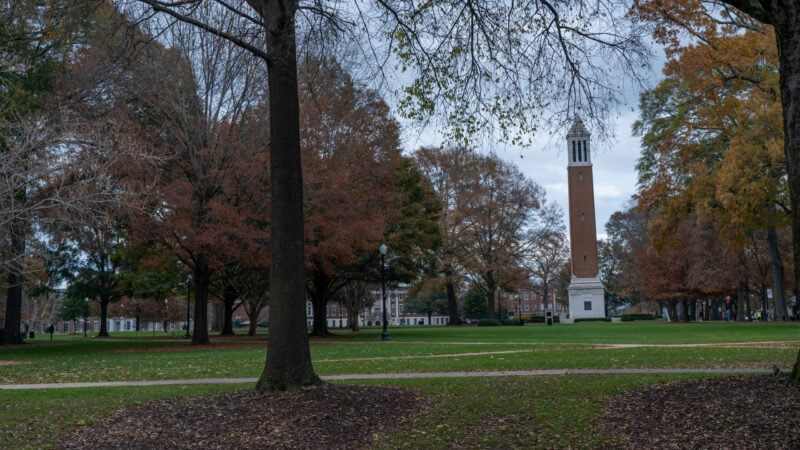Lawsuit by college professors and students challenges Alabama’s anti-DEI law
MONTGOMERY, Ala. (AP) — University professors and students in Alabama filed a lawsuit Tuesday challenging a new state law that bans diversity, equity and inclusion programs at universities and put limits on how race and gender can be discussed in the college classroom.
The complaint asserts the new law violates the First Amendment by placing viewpoint-based restrictions on educators’ speech and classroom lessons. Plaintiffs also argue the law is intentionally discriminatory against Black students because it targets concepts related to race and racism, limits programs that benefit Black students and eliminates campus spaces dedicated to student organizations that support Black students.
The NAACP Legal Defense Fund and the American Civil Liberties Union of Alabama filed the lawsuit on behalf of the Alabama State Conference of the NAACP and professors and students at the University of Alabama and the University of Alabama at Birmingham. The lawsuit asks a federal judge to declare the law unconstitutional and block the state from enforcing it.
“The Alabama Legislature’s censorship of important discussions about race and gender inequalities and its attack on so-called DEI programs are an affront to the constitutional rights of Alabama faculty and students,” Antonio L. Ingram II, Legal Defense Fund senior counsel, said in a statement about the lawsuit. “The harms are particularly salient for Black, LGBTQ+, and other faculty and students of color, whose histories and lived experiences have been dismissed, devalued, and undermined on their campuses.”
The Alabama measure, which took effect Oct. 1, is part of a wave of proposals from Republican lawmakers across the country taking aim at DEI programs on college campuses. Republicans say the programs deepen divisions and promote a particular political viewpoint. Opponents of the measure say it is a rollback of hard-won advances and programs that welcome underrepresented student populations. The lawsuit names Alabama Gov. Kay Ivey and university trustees as defendants.
“The governor stands behind this legislation and its intent,” Ivey spokesperson Gina Maiola wrote in a text message to The Associated Press.
The Alabama law prohibits universities, K-12 school systems and state agencies from sponsoring DEI programs, defined as classes, training, programs and events where attendance is based on a person’s race, sex, gender identity, ethnicity, national origin or sexual orientation. The bill also prohibits classes and training that advocate for eight “divisive concepts” including that a person should feel guilt because of their race or that fault, blame or bias should be assigned to people based on race, religion, gender or national origin.
The lawsuit lists a litany of impacts on students and professors. A social work professor said she was threatened with being fired unless she canceled a class project in which students had decided to analyze the potential negative impacts of the new state law. A political science professor said university officials told her that her course on poverty could violate the law because of its “perceived focus on learning about systematic racism,” according to the lawsuit.
Universities shuttered or rebranded their DEI offices in the wake of the law.
Lynn L. Cole, a spokesperson for the University of Alabama system, said it did not have a comment on the lawsuit.
In Florida, a similar lawsuit filed several years ago challenged the state’s “Stop WOKE” act. A federal judge issued a preliminary injunction in 2022 blocking a portion of the law that restricted certain race-based conversations and analysis in colleges.
The case is on appeal, and in July the judge overturned a portion of the law related to private businesses.
The FDA creates a quicker path for gene therapies
The Food and Drug Administration aims to evaluate treatments for rare diseases based on plausible evidence that they would work — without requiring a clinical trial first.
BAFTAs apologize after guest with Tourette syndrome uses racial slur during ceremony
A man with Tourette syndrome shouted a racial slur and other offensive remarks during the BAFTA awards ceremony Sunday. The BBC did not edit out his outbursts in its delayed broadcast.
‘Everything was in pieces:’ Lindsey Vonn describes grueling surgery on broken leg
In a recent video, the Olympic skier credits her surgeon with saving her leg from potential amputation.
A new lawsuit alleges DHS illegally tracked and intimidated observers
Observers watching federal immigration enforcement in Maine who were told by agents they were "domestic terrorists" and would be added to a "database" or "watchlist" are now part of a new federal class action lawsuit.
Kate Hudson on regret, rom-coms and finding a role that hits all the notes
Hudson always wanted to sing, but feared it would derail her acting career. Now she's up for an Oscar for her portrayal of a hairdresser who performs in a Neil Diamond tribute band in Song Sung Blue.
A powerful winter storm is roiling travel across the northeastern U.S.
Forecasters called travel conditions "extremely treacherous" and "nearly impossible" in areas hit hardest by the storm, and air and train traffic is at a standstill in many parts of the region.








